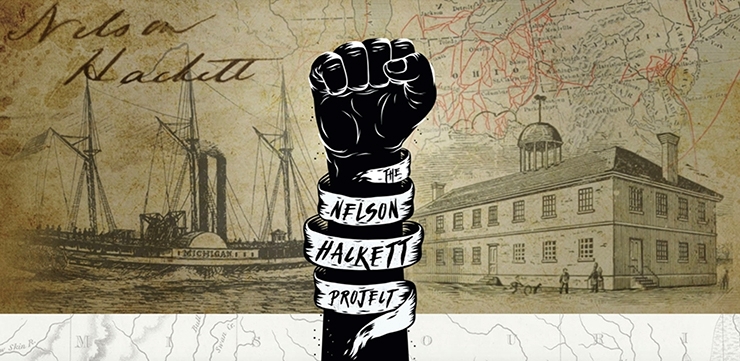'Nelson Hackett Project' Joins National Parks' Underground Railroad Program

An image from the website of the U of A's Nelson Hackett Project.
FAYETTEVILLE, Ark. – Douglas Emhoff, second gentleman of the United States, and Deb Haaland, secretary of the U.S. Department of Interior, recently announced 16 additions to the National Park Service’s National Underground Railroad Network to Freedom Program, which will include The Nelson Hackett Project.
The Nelson Hackett Project is a scholarly research and public history program of the University of Arkansas Humanities Center.
The National Park Service’s Underground Railroad Network to Freedom Program is a catalyst for innovation, partnerships and scholarship, and connects and shares the diverse legacy of the Underground Railroad across boundaries and generations.
It coordinates preservation and education efforts nationwide and integrates local historical places, museums and interpretive programs associated with the Underground Railroad into a mosaic of community, regional and national stories.
The U of A’s Nelson Hackett Project joins nearly 700 other sites, programs and facilities in the network that honor, preserve and promote the history of resistance to enslavement through escape and flight.
A recording of the April 23 announcement can be viewed via YouTube.
During the announcement, Haaland said, “Today’s announcement reminds us of the dark pages in our history books, but also highlights the incredible strength and resilience of Black communities.
“We need to look no further than the news of this week to know that our work is not done and commit ourselves to real progress. To do that, we must start by recognizing the history that brought us here,” she added.
Directed by U of A associate professor of history Michael Pierce, the Nelson Hackett Project is a digital history program that explores and the life and legacy of its namesake, freedom seeker Nelson Hackett.
In 1841, Hackett escaped enslavement in the frontier town of Fayetteville and fled to Canada, where he thought his freedom was secure. Despite opposition, he was extradited from Canada, becoming the first and only freedom seeker that Canada returned to bondage in the United States. Abolitionists, outraged by this, successfully fought to change Canada’s extradition policies so that other freedom seekers would not meet the same fate.
“Inclusion in the National Park Service Program literally puts Fayetteville on Freedom’s map,” Pierce said. “It brings national attention not only to Hackett and the region, but also to the University of Arkansas and its efforts to promote broader understandings of the past.”
Pierce spearheaded the research on Hackett and negotiation with the National Park Service. The Nelson Hackett Project emerged from the Arkansas Stories of Place and Belonging project, which was funded by a Chancellor’s Innovation Grant secured for the University of Arkansas Humanities Center by then director and now Vice Provost for Faculty Development Kathryn Sloan.
The Nelson Hackett Project is available online and can be accessed anytime.
About the University of Arkansas: As Arkansas' flagship institution, the U of A provides an internationally competitive education in more than 200 academic programs. Founded in 1871, the U of A contributes more than $2.2 billion to Arkansas’ economy through the teaching of new knowledge and skills, entrepreneurship and job development, discovery through research and creative activity while also providing training for professional disciplines. The Carnegie Foundation classifies the U of A among the top 3% of U.S. colleges and universities with the highest level of research activity. U.S. News & World Report ranks the U of A among the top public universities in the nation. See how the U of A works to build a better world at Arkansas Research News.
Topics
Contacts
Andra Liwag, director of communications
Fulbright College of Arts and Sciences
479-575-4393,
liwag@uark.edu
Trish Starks, professor of history and director
The Arkansas Humanities Center
479-575-7592,
tstarks@uark.edu
Headlines
U of A's Inspirational Chorale Makes Its Carnegie Hall Debut
The U of A's Inspirational Chorale took center stage at Carnegie Hall in March, performing under the direction of professor Jeffrey Murdock to a packed audience at the iconic Stern Auditorium.
The State of Economics With Mervin Jebaraj Set for June 5
U of A economist Mervin Jebaraj will analyze state's economic trends and regional issues in an upcoming talk. Preregistration is required by May 31.
Faculty Demonstrate Dedication to Student Success Through Teaching Credentials
Eight faculty members from across the U of A have earned the prestigious Association of College and University Educators certification in Effective College Teaching.
Artificial Intelligence, Machine Learning Boost Arkansas Animal Science Research
Aranyak Goswami, a bioinformatics specialist, will work with three different departments to boost the research arm of the U of A System Division of Agriculture.
College of Education and Health Professions Doctoral Student Picked for Grosvenor Fellowship
Jessica Culver, a doctoral student in the College of Education and Health Professions Adult and Lifelong Learning program, has been selected as a member of the 2024 Grosvenor Teacher Fellowship.




